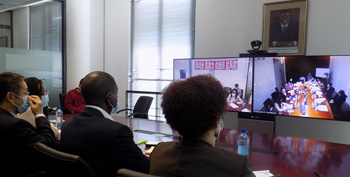
FDI, gender spillovers and firm productivity: The Namibian case

By Freeman Ya Ngulu.
Reem El Sherif, who currently leads Strategy in Rand Merchant Bank Namibia, did research on Gender Spillovers in foreign direct investments and how this applies to Namibian institutions.
The Stellenbosch Business School graduate found in her research that the female labour channel tends to have a greater presence than the total labour channel in the manufacturing sector. The services sector, however, shows a lesser instance of gender spillovers than the manufacturing sector, but tends to be equal to the total labour channel.
Multinational companies through their employment and investment in women, can contribute to the improvement of the Namibian economy. Exactly how this mechanism functions, is the core focus of El Sherif’s research for a PhD dissertation.
Her findings indicate that sector dynamics contribute significantly to the ability of females to transmit knowledge from multinationals to local firms, due to their different female labour participation and skills development opportunities.
Conventional assessment of Foreign Direct Investment stipulates that the presence of a multinational in a host country introduces two main benefits, technology and knowledge diffusion, also known as spillovers.
The former occurs when a multinational introduces new technology that was not previously available in the host country and is adoptable by its domestic firms. The latter happens when one investor learns from another’s outcome. This comes with the condition that replication can occur at no cost. Earlier research conducted in 1997 also shows that multinationals conduct most of the world’s R&D and knowledge can leak for the benefit of host economies through transfers from parent to subsidiaries.
While the research does not cover mining firms, the high FDI shares in services and manufacturing sectors provide an adequate context to estimate spillovers. Thus, Namibia provides a unique context from where to observe spillovers due to its investment reforms, geographical location and economic history.
Namibia, through the former Namibian Investment Centre (NIC), now reinstated as the Namibia Investment Promotion and Development Board (NIPDB), has been successful in attracting FDI, substantially more so than its neighbours.
A comparison of FDI flows into Namibia and its Southern African peers shows that Namibia is ranked second, after South Africa in attracting FDI flows. FDI flows in Namibia increased from US$29.5 million in 1990 to a peak of US$1 billion in 2012 (South Africa: US$4.6 billion and Botswana: US$146 million). FDI flows, however, declined to US$280 million in 2017 (South Africa: US$2 billion and Botswana US$261 million).
Despite this drop, FDI flows remain well-above the post-independence levels of the 1990s. The Bank of Namibia only started assimilating FDI per sector since 2017. The most recent report as at December 2020 shows that FDI is concentrated in the mining sector (56.8%), services (33.7%) and manufacturing (7.8%). The successful attraction of FDI into Namibia is typically attributed to the country’s stable political environment, developed infrastructure and established financial and regulatory institutions as prerequisites to foreign investment.
El Sherif pointed out that spillovers may effect policy decisions with evidence that manufacturing multinationals can exert strong spillovers through both the backward and forward linkages, while the services multinationals record strong spillovers through forward linkages only.
Technology and knowledge spillovers can take place through the multinational-supplier relationship in the manufacturing sector, as there will be mutual benefits to provide supplier assistance to improve the quality of inputs and service delivery. Similarly, downstream players can benefit from spillovers from multinationals in both the manufacturing and services sectors, which could enhance their managerial, marketing and distribution activities.

Reem El Sherif is a PhD candidate in the Department of Development Finance at the University of Stellenbosch Business School.













































